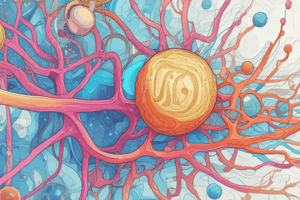Podcast
Questions and Answers
What is the role of growth chemicals in microbial cells?
What is the role of growth chemicals in microbial cells?
- Converting into new cells under genetic direction (correct)
- Regulating cellular communication
- Directing genetic information
- Producing energy for cellular activities
How do some microbial cells utilize motility?
How do some microbial cells utilize motility?
- To store genetic information
- To carry out chemical reactions
- To communicate with other cells
- To move away from unfavorable conditions (correct)
What are the two ways in which routine activities of microbial cells are carried out?
What are the two ways in which routine activities of microbial cells are carried out?
- Genetic functions and communication
- Catalytic functions and genetic functions (correct)
- Spore formation and differentiation
- Metabolism and evolution
What is the function of ribosomes in a cell?
What is the function of ribosomes in a cell?
Where is almost all of the cell's hereditary information located?
Where is almost all of the cell's hereditary information located?
What distinguishes the nucleoid in prokaryotic cells from the nucleus in eukaryotic cells?
What distinguishes the nucleoid in prokaryotic cells from the nucleus in eukaryotic cells?
What are the 4 chemical components that form 95% of the dry weight of a microbial cell as mentioned in the text?
What are the 4 chemical components that form 95% of the dry weight of a microbial cell as mentioned in the text?
Which of the following is a role of the cell wall in some types of microbial cells?
Which of the following is a role of the cell wall in some types of microbial cells?
Why are microbes considered excellent experimental systems for understanding cellular processes?
Why are microbes considered excellent experimental systems for understanding cellular processes?
What makes microorganisms important for biogeochemical cycles according to the text?
What makes microorganisms important for biogeochemical cycles according to the text?
Study Notes
Growth and Development
- Growth chemicals, such as amino acids, vitamins, and sugars, are essential for microbial cell growth and development.
- Motility, the ability to move, is utilized by some microbial cells to access nutrients, escape harsh environments, and interact with other cells.
Cellular Activities
- Routine activities of microbial cells are carried out through two main processes: metabolic reactions and biosynthesis.
- Metabolic reactions involve the breakdown and synthesis of molecules, while biosynthesis involves the production of new molecules.
Cell Structure and Function
- Ribosomes, found throughout the cell, are responsible for protein synthesis, playing a vital role in cellular functions.
- Almost all of a cell's hereditary information is located in the nucleoid region (prokaryotic cells) or nucleus (eukaryotic cells).
Prokaryotic and Eukaryotic Cells
- The nucleoid in prokaryotic cells lacks a membrane-bound nucleus, unlike the nucleus in eukaryotic cells, which is membrane-bound.
Chemical Composition
- The four chemical components that form 95% of the dry weight of a microbial cell are carbohydrates, proteins, nucleic acids, and lipids.
Cell Wall Function
- The cell wall provides structural support, maintains cellular shape, and protects the cell from external forces in some types of microbial cells.
Significance of Microorganisms
- Microbes are considered excellent experimental systems for understanding cellular processes due to their rapid growth rates, simplicity, and genetic manipulability.
- Microorganisms are important for biogeochemical cycles because they play a crucial role in nutrient cycling, decomposition, and the formation of fossil fuels.
Studying That Suits You
Use AI to generate personalized quizzes and flashcards to suit your learning preferences.
Description
Test your knowledge on various characteristics of cell environment including growth, differentiation, communication, and microbial cell features. Explore how cells interact with their surroundings and adapt to changing conditions.




